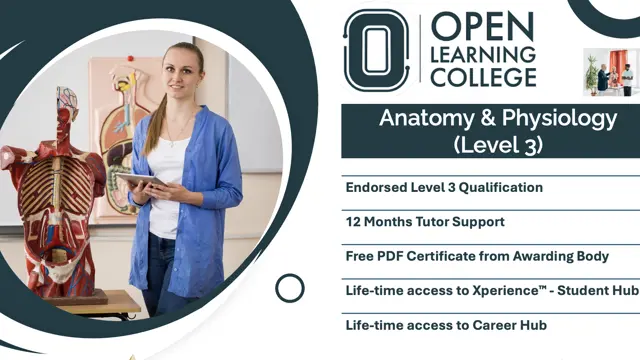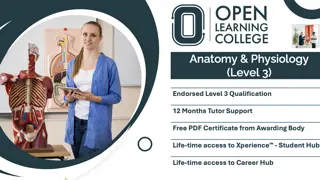
Anatomy & Physiology (Level 3)
Distance Learning Course, featuring tutor support and AI assistance, available online or as a study pack option.
Open Learning College
Summary
Funding options available on our website
- QLS & OPA - Free
- Exam(s) / assessment(s) is included in price
- Tutor is available to students
- TOTUM card included in price What's this?
Add to basket or enquire
Overview
Embark on a transformative learning journey with the UK’s most innovative home study provider, offering courses designed to unlock your true potential and facilitate the career change you desire. Access our distance learning courses directly from anywhere, anytime, and acquire industry-recognised Professional Qualifications essential for advancing in your career.
Specifically, explore the flexible and convenient Anatomy + Physiology (Level 3) course, an ideal way to gain a diploma qualification. Whether you aim for further education, improved job prospects, or expanded knowledge, this comprehensive course allows you to prepare thoroughly for exams or careers through home study. Plus, it’s structured to be accessible and beneficial even if you have no prior knowledge in Anatomy + Physiology.
This Level 3 course in Anatomy and Physiology aims at providing a foundation in the subject area. Those who wish to enter into studies in the field of complimentary medicines or merely wish to improve their knowledge in this area will find this course particularly attractive. The course will equally provide a basis for those looking at furthering their vocation in the public sector.
Achievement
Course media
Resources
- Anatomy + Physiology Level 3 (QLS) Course -
Description
What Will You Learn?
- The Anatomy and Physiology course delves deep into the intricate workings of the human body.
- It offers a comprehensive understanding of the physiological systems, organs, and their functions.
- Learners explore the anatomical structures, studying the skeletal, muscular, nervous, cardiovascular, respiratory, and digestive systems in detail.
- The course delves into cellular structures, examining how cells work, reproduce, and communicate. Moreover, it provides insights into the integration of systems, exploring how the body maintains homeostasis.
- Learners grasp the interconnection between anatomy and physiology, gaining knowledge that's vital for various healthcare professions or those interested in understanding the human body's complexities.
- Throughout this course, individuals acquire a profound comprehension of the body's mechanisms, enabling a deeper appreciation of human health and function.
Course Key Topics
The Anatomy + Physiology (Level 3) course is divided into 10 modules.
Module 1: Introduction to the Human Body
The first module is an outline of the course contents and introduces the body systems in a rational manner, demonstrating the links that exist between them. The content also covers basic body chemistry and organization in preparation for subsequent modules.
The course material covers three main areas:
* Homeostasis, including the areas of; negative feedback mechanisms, positive feedback mechanisms, survival mechanisms, transport systems, internal communications systems, Intake and elimination.
* Body chemistry, including the areas of; Atoms, molecules and compounds.
* Organization, including; Cell structure and function, tissues, and organization of body structures and systems.
Module 2: Communication Systems within the Body: Part 1
There are three modules related to the subject of communication, structures and organs. These enable the body to communicate both internally and with the external world will be presented. In addition to structure, function and physiological aspects, each module will give brief information on some more common diseases and disorders.
* Blood: Composition, functions and common disorders.
* Cardiovascular System: Vessels, heart, circulation, blood pressure, pulse and common disorders and diseases.
Module 3: Communication Systems within the Body: Part 2
*Lymphatic: Vessels, organs and tissues; structure and function, common disorders and diseases.
*Nervous system: Structure and function; brain and spinal cord; autonomic nervous system; common disorders and diseases.
Module 4: Communication Systems within the Body: Part 3
* Special senses: The ear: structure and function, The eye: structure and function, Physiology of smell and taste, and Common disorders and diseases.
* Endocrine system: Structure and function; common disorders and diseases.
Module 5: Intake and Elimination Systems of the Body: Part 1
Three further modules cover intake and elimination. The student will focus more specifically on how the body functions, what it requires to maintain function and growth and the mechanisms that are in place for the elimination of waste products.
* The unit will also look at the respiratory system, taking into consideration:
The structure and function, including upper and lower respiratory tracts.
* Physiology of respiration.
* Common disorders and diseases that effect the respiratory system.
Module 6: Intake and Elimination Systems of the Body: Part 2
Within this unit, the course materials look at nutrition and investigates the structure and function of carbohydrates, fats, proteins, minerals, vitamins and water. A look is also taken at the digestive system, observing the structure and function, absorption of nutrients, metabolism and common disorders and diseases.
Module 7: Intake and Elimination Systems of the Body: Part 3
This unit of study focuses on the urinary system, investigating:
* Structure and function.
* Physiology of micturition.
* Common disorders and diseases.
Module 8: The Survival and Protective Systems of the Body: Part 1
The final three modules will cover survival and protection. Students will examine basic genetics, the replication of the human cell, together with repair and how cells deal with invasion of bacteria, viruses and external breaches of defence mechanisms (for example wounds).
A look will also be given to the skin, its structure and function, wound healing and common disorders and diseases that can occur on the skin. The unit will then progress on to look at immunity, with particular attention given to:
* Inflammatory response.
* Cell mediated immunity.
* Anti body immunity.
* Acquired immunity.
* Common disorders and diseases.
Module 9: The Survival and Protective Systems of the Body: Part 2
This unit gives special consideration to the musculoskeletal System, focusing on the structure and function of bone. Investigations into the following areas are also covered:
* Axial skeleton.
* Appendicular skeleton.
* Joints.
* Muscles.
* Common disorders and diseases.
Module 10: The Survival and Protective Systems of the Body: Part 3
Lastly, in this final unit of the course, the course materials take a look at basic genetics, covering areas such as:
* Chromosomes, genes and DNA.
* Protein synthesis.
* Cell division and inheritance.
* Common disorders and diseases.
The unit will also look into the reproductive systems, taking a closer look at:
* Structure and function.
* Common disorders and diseases.
What's Included
- All online textbooks, study guides, and learning aids designed for online learning.
- A full range of student services, including 12 months tutor access.
- Free Open Learning College branded promotional item when you enrol.
- A personalised award upon course completion with unlimited educational support.
- PDF or hardcopy certificate to show employers (employer has access to certificate validation)
- Life-time access to Xperience™ our innovative, interactive Student Hub.
- Life-time access to Career Hub our dedicated portal to support our students career aspirations.
- Learning for Life Pack
- Invitation to job fairs and career days for your faculty.
Who is this course for?
- The Anatomy and Physiology course caters to a diverse audience keen on delving into the intricacies of the human body.
- It's tailored for aspiring healthcare professionals such as nurses, physiotherapists, and medical students seeking a robust understanding of human anatomy and physiological functions.
- Additionally, individuals interested in complementary medicine, sports science, or those pursuing careers in fitness and wellness will find this course invaluable.
- It's also suitable for educators or anyone fascinated by the human body and eager to expand their knowledge.
- Ultimately, it welcomes learners from various backgrounds who aspire to comprehend the complexities of human anatomy and physiology.
Requirements
- The good news is that no prior learning knowledge or experience is essential to take this course. This course is openly available to anyone wishing to learn more about Anatomy + Physiology (Level 3) and would like to take part in a highly rewarding distance learning study course.
- We believe that everyone should have the opportunity to expand their knowledge and study further, so we try to keep our entry requirements to a minimum.
- You have the freedom to start the course at any time and continue your studies at your own pace for a period of up to 12 months from initial registration with full tutor support.
Career path
As an anatomical pathology technologist (APT), you’ll work in mortuaries assisting pathologists conducting post-mortem examinations. You’ll take and deliver samples of tissue and fluids, which will help you understand disease processes as well as establish the cause of death. You’ll also reconstruct and clean the body afterwards to the highest standard, so it can be viewed by loved ones.
Questions and answers
Certificates
QLS & OPA
Digital certificate - Included
Open Learning College have undergone external quality checks to ensure that the organisation and the courses’ it offers meet a high standard. Regular reviews of our courses are carried out as part of the endorsement process.
The course depth and study has been benchmarked at Level 3 against level descriptors published by Ofqual.
Visit www.qualitylicencescheme.co.uk for more information.
1. You will receive your accreditation directly from QLS, once you have successfully completed your course (certification fees are included in the course fee).
2. You will receive the Open Pathway Accreditation Diploma (OPA.dip) from Open Learning College.
Reviews
Currently there are no reviews for this course. Be the first to leave a review.
Legal information
This course is advertised on reed.co.uk by the Course Provider, whose terms and conditions apply. Purchases are made directly from the Course Provider, and as such, content and materials are supplied by the Course Provider directly. Reed is acting as agent and not reseller in relation to this course. Reed's only responsibility is to facilitate your payment for the course. It is your responsibility to review and agree to the Course Provider's terms and conditions and satisfy yourself as to the suitability of the course you intend to purchase. Reed will not have any responsibility for the content of the course and/or associated materials.



